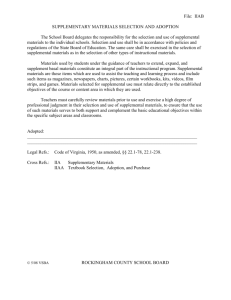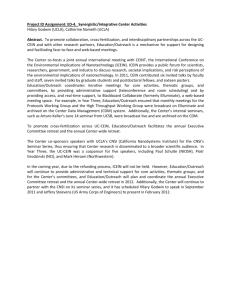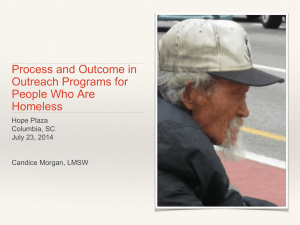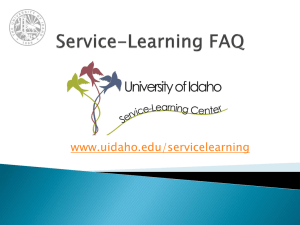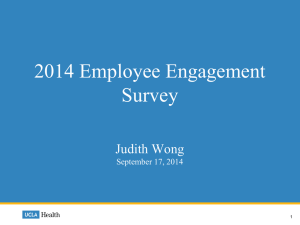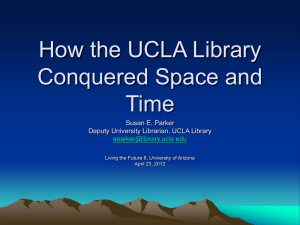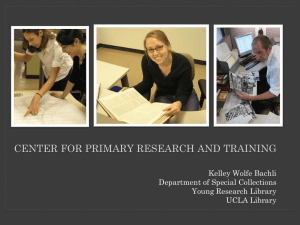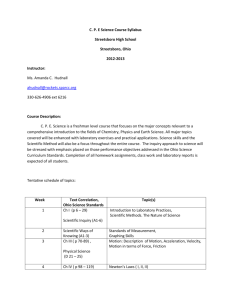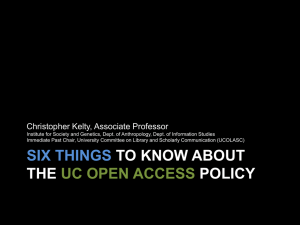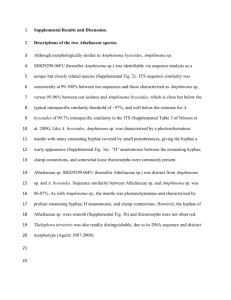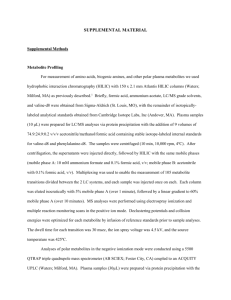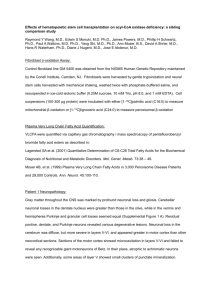COMMUNITY SERVICE LEARNING
advertisement
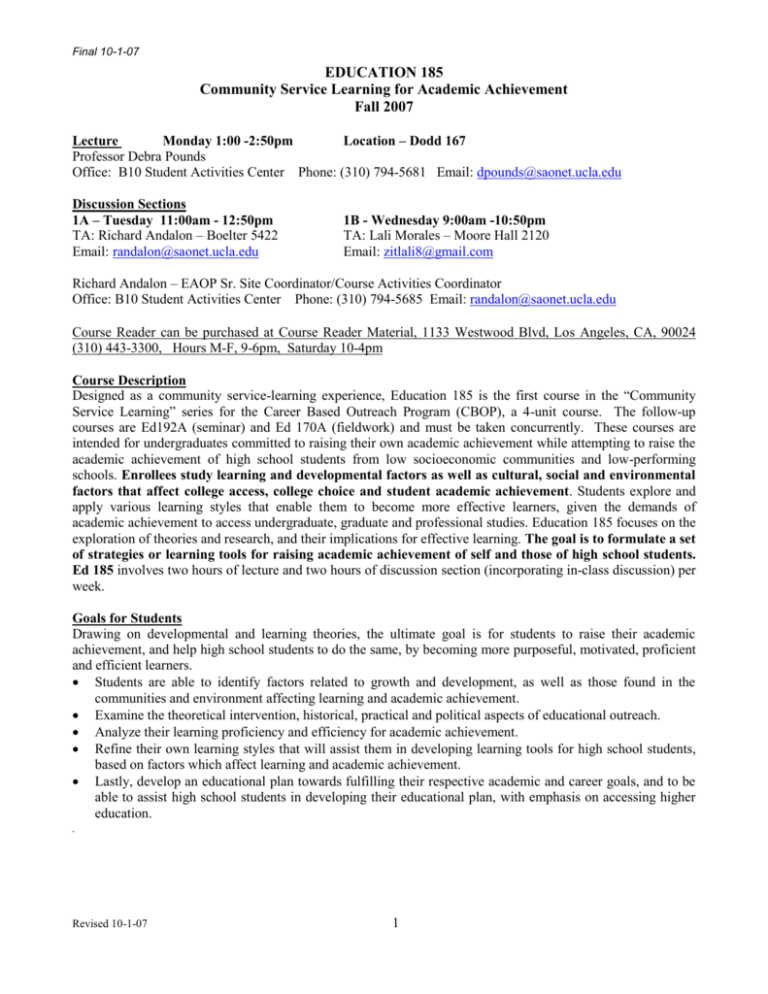
Final 10-1-07 EDUCATION 185 Community Service Learning for Academic Achievement Fall 2007 Lecture Monday 1:00 -2:50pm Location – Dodd 167 Professor Debra Pounds Office: B10 Student Activities Center Phone: (310) 794-5681 Email: dpounds@saonet.ucla.edu Discussion Sections 1A – Tuesday 11:00am - 12:50pm TA: Richard Andalon – Boelter 5422 Email: randalon@saonet.ucla.edu 1B - Wednesday 9:00am -10:50pm TA: Lali Morales – Moore Hall 2120 Email: zitlali8@gmail.com Richard Andalon – EAOP Sr. Site Coordinator/Course Activities Coordinator Office: B10 Student Activities Center Phone: (310) 794-5685 Email: randalon@saonet.ucla.edu Course Reader can be purchased at Course Reader Material, 1133 Westwood Blvd, Los Angeles, CA, 90024 (310) 443-3300, Hours M-F, 9-6pm, Saturday 10-4pm Course Description Designed as a community service-learning experience, Education 185 is the first course in the “Community Service Learning” series for the Career Based Outreach Program (CBOP), a 4-unit course. The follow-up courses are Ed192A (seminar) and Ed 170A (fieldwork) and must be taken concurrently. These courses are intended for undergraduates committed to raising their own academic achievement while attempting to raise the academic achievement of high school students from low socioeconomic communities and low-performing schools. Enrollees study learning and developmental factors as well as cultural, social and environmental factors that affect college access, college choice and student academic achievement. Students explore and apply various learning styles that enable them to become more effective learners, given the demands of academic achievement to access undergraduate, graduate and professional studies. Education 185 focuses on the exploration of theories and research, and their implications for effective learning. The goal is to formulate a set of strategies or learning tools for raising academic achievement of self and those of high school students. Ed 185 involves two hours of lecture and two hours of discussion section (incorporating in-class discussion) per week. Goals for Students Drawing on developmental and learning theories, the ultimate goal is for students to raise their academic achievement, and help high school students to do the same, by becoming more purposeful, motivated, proficient and efficient learners. Students are able to identify factors related to growth and development, as well as those found in the communities and environment affecting learning and academic achievement. Examine the theoretical intervention, historical, practical and political aspects of educational outreach. Analyze their learning proficiency and efficiency for academic achievement. Refine their own learning styles that will assist them in developing learning tools for high school students, based on factors which affect learning and academic achievement. Lastly, develop an educational plan towards fulfilling their respective academic and career goals, and to be able to assist high school students in developing their educational plan, with emphasis on accessing higher education. . Revised 10-1-07 1 Final 10-1-07 Course Requirements Class Participation & 3-Minute Notes - 20% Attendance and involvement are essential to the success of both the program and individual student. Over three absences will result in dropping at least one-third of a letter grade (i.e. from an "A" to an "A-," from an “A-" to a “B+,” etc.) Students are expected to come prepared having already read the assigned weekly readings. It is important to remember that class participation is a critical part of ones grade. Therefore, students should place a high priority on being prepared to discuss the readings. Students will be required to turn in 3-MINUTE NOTES during Weeks 2-9, following each lecture. Notes should include any comments or reflective statements on the lecture or questions that have not been resolved during lecture and topic areas that need further clarification. Your name, date, and TA name should be on each note to receive full credit. There are no make-up assignments if you miss lecture. Team Teaching - 20% Each team will have an opportunity to prepare and present a class lesson during discussion section and or during lecture. The topics and suggested activities will be distributed and presentations will begin week 3. Interactive, engaging and very creative lesson plans are encouraged. The focus of the presentation will be on the undergraduate student for this quarter. Each lesson should engage the participation of the undergraduate student and serve as learning tools towards academic success. Groups may work with TAs and Richard in developing the activity. The last 10-15 minutes of each lesson will be devoted to discussing how the lesson can be applied in the designated high schools. The other students will submit comments and suggestions for improvement. Teams must submit: (1) lesson plan (goals and strategies), (2) copies of any handouts (if applicable), and (3) self-evaluation summary (after having read students’ and instructor/TA comments) no more than one week after the presentation. Mid-Term Exam - 30% Students will take an in-class essay midterm exam during WEEK #6. The midterm is open notes only. Final Paper - 30% The final paper is a research based paper that should demonstrate your understanding of educational attainment, college access theories, college choice process, cultural and social capital. The final paper will be written in three different stages, allowing students a chance to finalize their paper through a series of peer editing and “draft and re-write” assignments. In 7-10 pages, double-spaced, and typed, each student is required to develop an Individualized Educational Plan (IEP) that will enable him/her to successfully prepare and therefore access graduate/professional studies. Part A: The Plan is to be realistic with clear objectives and timelines. It should reflect learning the student has gained from this course, as well as knowledge gained from a consultation and advising session with a graduate/professional school adviser or a professional in that career field. Part B: Include at least 5 references (at least 2 research article references must come from outside the reader) to explain the personal and environmental factors that will enhance your educational plan. During Week #8 (Nov 19th) an outline of your final paper is due in discussion section. The first draft of your paper is due week 9 and will be peer reviewed extensively in discussion section. It is expected that all of your re-writing (including the final paper) incorporate/address the feedback provided by your peers and instructors. In addition, you must attach all feedback from your peers and instructors to the final version of your paper. Revised 10-1-07 2 Final 10-1-07 COURSE SCHEDULE AND READINGS Week 1 (Oct 1st): Introduction and History of UC Academic Preparation Programs & Services 1. Timar, T., Ogawa, R., & Orillion, M., (2004) Expanding the University of California Outreach Mission. Review of Higher Education, Volume 27, No.2 (187-209) 2. Tierney, Corwin, & Colyar., (2005) Preparing for College: Nine Elements of Effective Outreach State University of New York Press, Albany Supplemental Reading – To be distributed in class Corwin, Miles (2001) And Still We Rise. Harper-Collins, New York, NY Week 2 (Oct 8th): College Choice Theories and Research/College Advising 1. Cabrera, A., & La Nasa, S. (2000).Understanding College-Choice Process. New Directions for Institutional Research, no. 107. San Francisco: Jossey-Bass. 2. Mc Donough, P. (2004) The Impact of Advice on Price: Evidence from Research, a report commissioned by TERI with support from the LUMINA Foundation, Boston, MA 3. McDonough. (2005). Counseling Matters: Knowledge, Assistance, and Organizational Commitment in College Preparation. In Preparing for College: Nine Elements of Effective Outreach. Tierney, Corwin and Colyar (Eds.) Albany: State University of New York Press, pp.69-87 Supplemental Reading Investing in People -Why Diversity Matters pp 29-35, a publication report from the Business Higher Education Forum, 2002 Week 3 (Oct 15th): Background & Environmental Impact on College Choice 1. Freeman, K. (2005). African Americans and College Choice: The Influence of Family and School. State University of NY Press, Albany, pp 1-79 2. Teranishi, R.T., Ceja, M., Antonio, A., Allen, W.R. & McDonough, P.M. (2004). The College-Choice Process for Asian Pacific Americans: Ethnicity and Socio Economic Class in Context. The Review of Higher Education 27(4): pp. 527-551. 3. Tornatzky, Louis G., Richard Cutler, and Jongho Lee (April 2002). College Knowledge: What Latino Parents Need to Know and Why They Don’t Know It. Claremont CA: The Tomas Rivera Policy Institute. http://www.trpi.org/PDFs/College_Knowledge.pdf (access article via website) 4. “Caught in the Financial Aid Information Divide" - Key Findings (2004) Sallie Mae Fund & TRPI Supplemental Reading Putting Money on the Table:Information, Financial Aid and Access to College. CHEPA, Rossier School of Education, USC http://www.usc.edu/dept/chepa/pdf/Early_Commitment_Programs_final.pdf (access article via website) Week 4 (Oct 22nd): Personal Factors that Impede or Enhance Academic Success 1. Steele, Claude M. (1997) “A Threat in the Air: How Stereotypes Shape Intellectual Identity and Performance,” in American Psychologist, 52:6, 613-629 2. McMillan, James H. and Daisy F. Reed (1994), “At-Risk Students and Resiliency: Factors Contributing to Academic Success,” in The Clearing House, 67:3,137-140 Revised 10-1-07 3 Final 10-1-07 3. Dembo, Myron H. and Martin J. Eaton (1997) “Chapter 3: School Learning and Motivation,” Handbook of Academic Learning. Academic Press Inc., 65-103. Supplemental Reading - To be distributed in class Week 5 – (Oct 29th): The Service Learning Approach (Richard Andalon - lecturer) 1. Eyler, J., Giles, D. (1999). Where’s the Learning in Service-Learning? Jossey-Bass Publishers, San Francisco, CA 2. Furco, Andrew, (1996) “Service-Learning: A Balanced Approach to Experiential Education” Expanding Boundaries: Serving and Learning. Washington D.C. Cooperation for National Service, 2-6 3. Valencia, R. (1997). The Stanford Series on Education & Public Policy. The Evolution of Deficit Thinking: Educational Thought and Practice. London: The Falmer Press, 1-11 Supplemental Reading Rhoads, Robert A. (1997). Chapter 8 “Critical Community Service”, Community Service & Higher Learning: Explorations of the Caring Self. State University of New York Press. Week 6 (Nov 5th): Midterm In class midterm Mandatory Class General Assembly for Graduate/Professional school presentations in the evening. Location and time TBA during week #6. Week 7 (Nov 12th): NO CLASS – VETERAN’S HOLIDAY No Class – Veteran’s Holiday, campus closed. Week 8 (Nov 19th): Educational Attainment/The Financial Impact (Lali Morales - Lecturer) 1. Bidwell, C. E. (1989). “The Meaning of Educational Attainment.” Research in the Sociology of Education and Socialization, 8, 117-138. 2. Joint Economic Committee, US Congress “Investment in Education: Private and Public Returns” January 2000. Vice Chairman Jim Saxon (R-NJ) Washington DC 3. Becker, G. S. (1993). Human Capital: A Theoretical and Empirical Analysis, With Special Reference to Education. Chicago: The University of Chicago Press, 15-25. 4. American College Test (ACT), Ready for College and Ready for Work: Same or Different? 2006 ACT, Inc. USA Supplemental Reading Day, Jennifer C. & Newburger, E. (2002). The Big Payoff: Educational Attainment http://www.census.gov/prod/2002pubs/p23-210.pdf (access article via website) Week 9 (Nov 26th) Learning Theories and Learning Tools 1. King, Patricia M. (1996) “Student Cognition and Learning,” in Komives S. B. and Associates, Student Services: A Handbook for the Profession, 3rd Ed. San Francisco, CA: Jossey Bass, 218-243 2. Doby, Winston C. (1997). Learning: One Perspective. Los Angeles, CA: Early Academic Outreach Programs, University of California, Los Angeles Revised 10-1-07 4 Final 10-1-07 Supplemental Reading – To be distributed in class Freire, Paulo. (1983). Pedagogy of the Oppressed. New York: Continuum, pages 29-40, 71-86 Week 10 – (Dec 3rd) – The Achievement Gap 1. Callan, P., & et al., (2006) “Claiming Common Ground: State Policymaking for Improving College Readiness and Success”. The National Center for Public Policy & Higher Education 2. The Civil Rights Projects, Harvard University, executive summary “Confronting the Graduation Rate Crisis in California,” March 24, 2005. 3. Teranishi, R (2004). Black Residential Migration in California: Implications for Higher Education. UCOP Final Paper is due by noon on Tuesday, December 11, 2007 (finals week) in the professor’s mailbox, Student Activities Center (SAC) B10. No late papers or email attachments will be accepted. **Ethical Practices – All students are expected to abide by the code of academic integrity throughout this course and all other courses at UCLA. Academic dishonesty, including cheating, fabrication and plagiarism may be reported to the Dean of Students. For more information about UCLA Student Conduct Code visit www.deanofstudents.ucla.edu for a complete description of the policy. Revised 10-1-07 5
